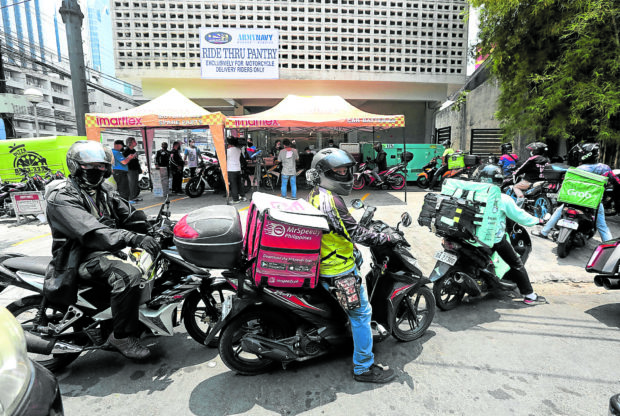MANILA, Philippines — Why are delivery riders and other workers in the so-called gig economy considered independent contractors instead of employees who are entitled to rights and protection under the Labor Code?
It’s a question that Senate Resolution No. 732 seeks to answer by calling for an investigation in aid of legislation that could provide “employment benefits and other forms of social protection for workers” in digital platforms.
“Without laws that regulate and define the rights of our gig economy workers, they will certainly be exposed to abuse and exploitation. Let’s not allow that no one [would] be held accountable in case something happens to delivery riders, motorcycle taxi riders, GrabCar drivers, or freelancers,” Sen. Risa Hontiveros said of the resolution she filed on Monday.
Through the resolution, Hontiveros said, policymakers are being urged to create a permanent social safety net that would cover all types of workers.
“Our employment landscape is evolving and so should our laws. With the rapidly expanding gig economy, Congress must plan and think more broadly about delinking health care, unemployment insurance, and other vital benefits from specific forms of employment,” the lawmaker added.
Workers classified as independent contractors are currently not entitled to healthcare benefits, 13th month pay, retirement pay, leave credits, days off, and other forms of basic labor rights found in the Labor Code, a statement from the senator’s office said.
Special report
“No one should be left out. Everyone should be part of the new normal. They should have enough protection and dignity in their work, regardless of their employment status,” Hontiveros added.
The resolution comes following a three-part special report published by the Inquirer earlier this month about the work status of food delivery drivers on digital platforms.
The report took note of the rise of such workforce in the country due to the community quarantines prompted by the coronavirus pandemic. It tackled the riders’ plight and vulnerabilities as an essential but still largely unprotected labor sector who are not entitled to separation pay and who may still be earning less than the minimum wage.
It looked into the case of LalaFood, a food delivery app that closed operations last February, without extending any form of support or separation pay to its riders. The company’s terms and conditions, which are publicly available, stipulated that a rider “declares he is not an employee, representative, principal, agent, or officer of LalaFood.”
Similar terms and conditions are found in other food delivery apps, such as GrabFood and Food Panda, which also classify their riders as independent contractors who are not entitled to employee benefits.
Newcomers like Pick.A.Roo and Dingdong PH have similar rider provisions, per their websites. An app called Toktok was launched last year.
The digital platforms have yet to reply to the Inquirer’s request for comments on the Senate resolution.
Developments abroad
Several countries have already classified food riders as employees of digital platforms, including Spain which made the change in March to comply with a Supreme Court ruling.
Also in March, a landmark ruling by the United Kingdom’s Supreme Court reclassified Uber’s 70,000 UK drivers as workers who are entitled to at least a minimum wage, vacation pay, and other benefits.
